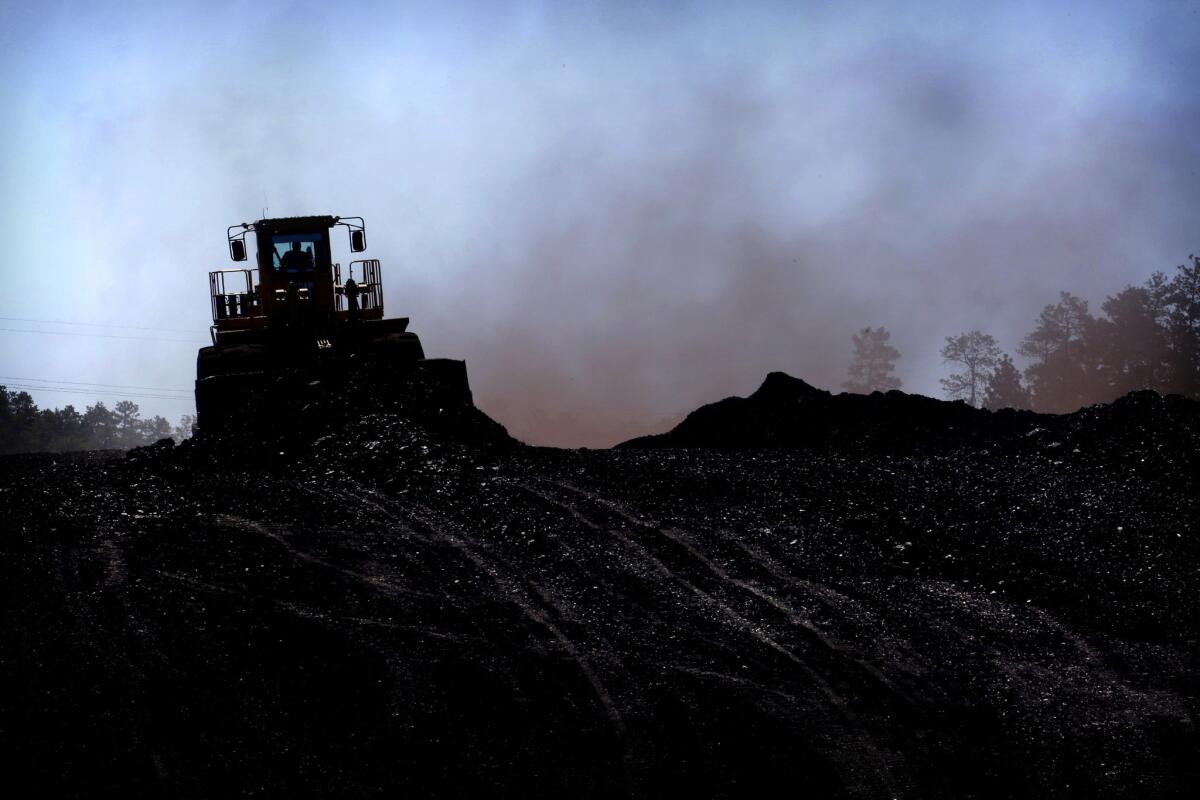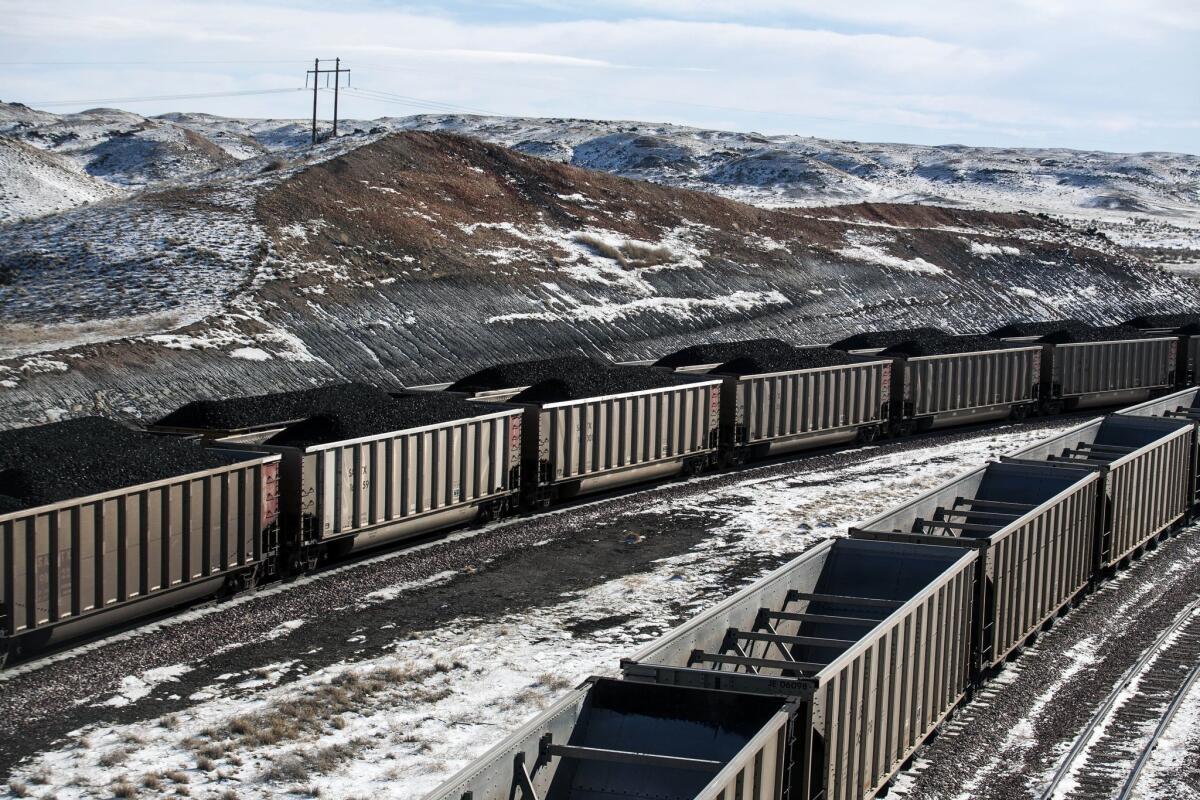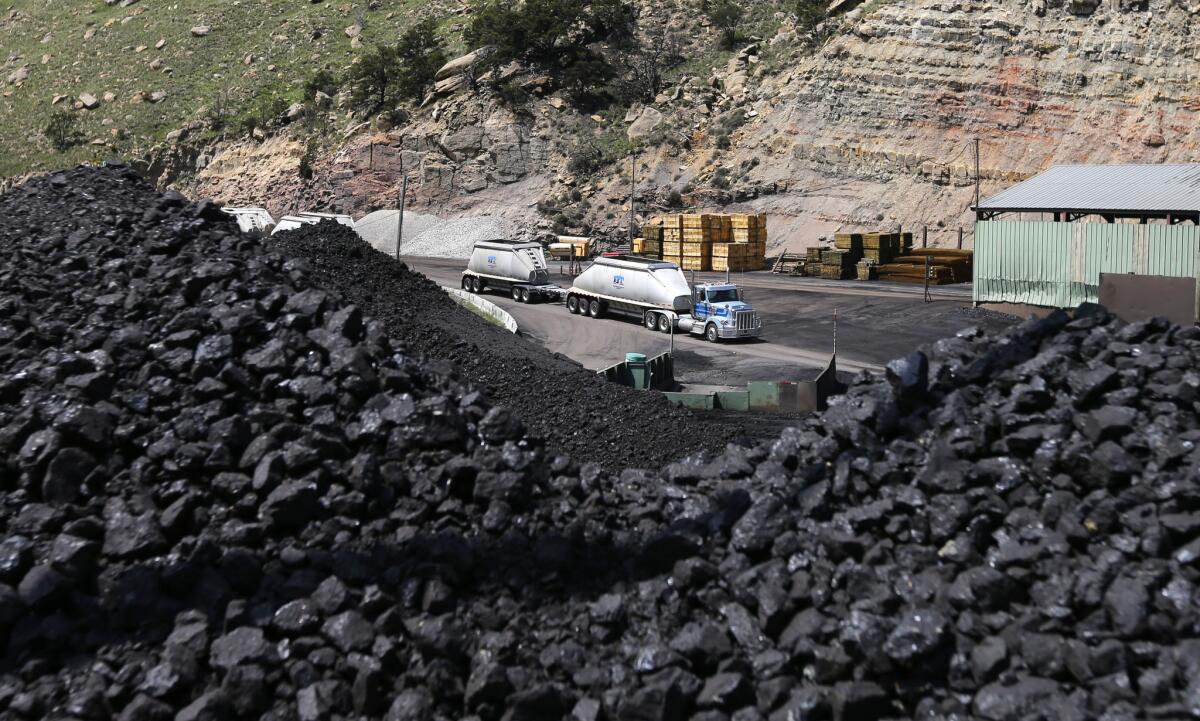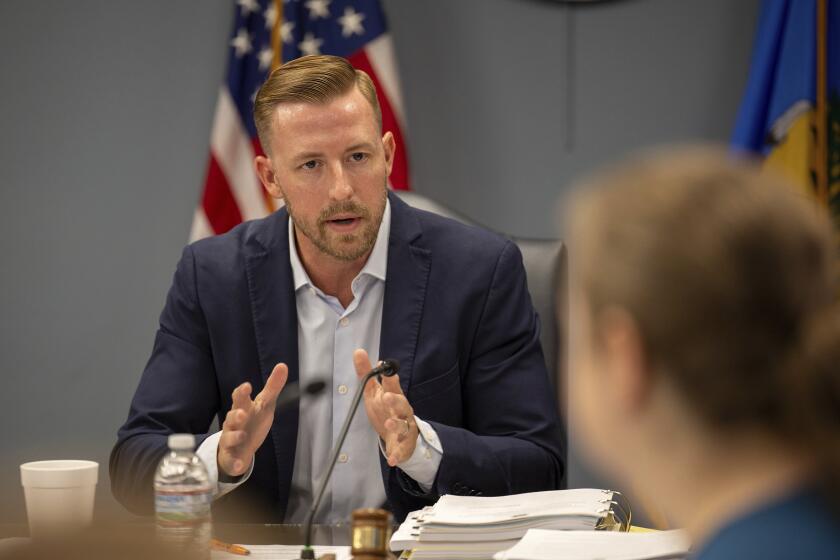Coal represents the polluted past -- except in the interior West
Reporting from SEATTLE — Environmentalists and energy experts have been saying it for a while now. So have private investors and federal regulators. Lawmakers across the West are increasingly saying it, too: The reign of King Coal is over.
Gov. Kate Brown of Oregon just signed into law a measure that would eliminate coal from the state’s power supply in less than two decades. Here in Washington, the Legislature also just adopted a plan that would eliminate coal. Last year, California moved to use renewables for half of its electricity by 2030.
And then there is Utah.
In the final hours of the state’s legislative session last week , the Utah House of Representatives began final debate on a measure to loan $53 million for a planned export facility in San Francisco Bay that would ship Utah coal to Asia. The idea is to provide a guaranteed market for coal mined in southern Utah, a region hard hit by the declining domestic coal market.
Opponents were exasperated that the plan – developed in secret last year by an investment banker who moonlighted as head of the Utah Transportation Commission – had suddenly emerged as legislation and made it to the floor barely a week after being introduced.
“If we were businessmen or a bank, and we were putting out $53 million, would we get an independent review before making that decision?” Rep. Joel Briscoe, a Democrat and the minority whip, asked the chamber. “I think we would.”
But speaker after speaker rose to say that no outside analysis was necessary. Utah coal is cleaner than most, they said. So clean it will actually help China solve its pollution problems. Wary investors will be proven wrong, they said, just as they were during the Great Recession.
Besides, this was about more than coal. This was about protecting rural jobs and families beaten down by federal regulation and limited economic options. Perhaps, they said, Utah could use the access it would gain to the terminal to export oil or potash, grain or alfalfa. Or even, somehow, the message of the Mormon church.
“Let’s bless the world,” Rep. Derrin Owens, a Republican, told his colleagues on the House floor.
The bill passed, 52 to 17, with six lawmakers not voting. Gov. Gary R. Herbert, also a Republican, is expected to sign it into law.
It he does, experts say, Utah will be going against well-established momentum. While coal is expected to remain an important part of the nation’s energy supply for many years, the rise of cheap natural gas and renewable wind and solar energy has sent its value into steep decline.

Coal dust fills the air at the Absaloka coal mine in Montana.
Utah acted on the same day that one of the nation’s largest coal companies, Arch Coal, facing bankruptcy, announced that it was suspending its long-standing plans to develop an ambitious mine in Montana -- in part because demand in Asia had plummeted.
It was also the same day that the United States Energy Information Administration released estimates showing national coal production declined 29% in the first 10 weeks of 2016 compared with the same period last year.
It acted even as the editorial page of the Deseret News, one of Utah’s more conservative publications (and that is saying something), said that the bill had “too many red flags.”
Yet it did not necessarily act out of character with all corners of the West. Montana lawmakers and some tribal leaders there have expressed deep frustration that states on the coast have fought efforts to export coal, with some governors and tribal leaders traveling to the coast to show support for port projects.

Rail cars are filled with coal and sprayed with a topper agent to suppress dust at Cloud Peak Energy’s Antelope Mine north of Douglas, Wyo.
Wyoming, which produces more coal than any other state, has pledged $15 million toward a testing center that will look for ways to turn carbon dioxide into new products, and it has spent smaller amounts to promote the industry. Last year, it passed a law giving its public-private development arm, the Wyoming Infrastructure Authority, the ability to invest as much as $1 billion in projects out of state if it can sell bonds for them. The idea was to help build coal export terminals.
But the state has made no such investments and Jason Begger, executive director of the Wyoming agency, said in an interview this week that doing so would be risky in light of the current market and resistance to coal terminals on the coast.
“You never say never, but it would probably be unlikely that our bonding authority would ever be used on a port project,” Begger said.
Other than Utah, he said, referring to coal-producing Western states, “I’m not aware of any states that have stepped up and actually provided a mechanism to provide funding to a port project.”
The Utah plan did not begin in the Legislature. Last spring, Jeffrey Holt, a longtime investor in port and infrastructure projects who also served as chairman of the state transportation commission, helped develop a plan that would use $53 million in federal royalty payments from mining leases to help four coal-producing counties invest in the project. Holt and his firm, the Bank of Montreal, stood to gain more than $1 million in the deal and a related rail line.
Holt tried to keep the plan secret, saying in emails later made public that “the script was to downplay coal.” The plan was criticized by environmental groups, who wrote to the Utah attorney general’s office raising questions about the legality of the arrangement. In December, Holt abruptly resigned his position on the transportation commission, but he was present at the Utah Capitol this week as lawmakers considered the bill.
The law passed by the Legislature would use state money to fund the port project, but it would reimburse the state with the federal royalty money.
“It’s being laundered,” said Ted Zukoski, a lawyer for Earthjustice.

Piles of coal wait to be loaded into trucks at the Sufco Coal Mine, 30 miles east of Salina, Utah.
The plan has also met strong opposition in Oakland, where city officials have been weighing whether they can take action to stop it. Loni Hancock, a Democrat in the California state Senate who represents Oakland, wrote to her counterparts in Utah expressing opposition.
“We have to consider the broader impacts of what we do, and exporting Utah coal through the city of Oakland would undermine the many climate change and environmental policies adopted by California,” Hancock wrote March 1.
The Oakland terminal project has been led by by Phillip Tagami, a longtime friend and investment partner of Gov. Jerry Brown. A company owned by Tagami has agreed to lease the site to a newly created entity called Terminal Logistics Solutions.
Public records from March 2015, however, show that, at least under a plan being developed at that point, the company that would operate the terminal would be controlled in part by Bowie Natural Resources, the company whose Utah coal mines would serve the terminal. A report in the East Bay Express last week showed Bowie had made $29,000 in campaign contributions to Utah lawmakers who have supported the state’s involvement. It has given $14,000 to Gov. Herbert since 2014.
Terminal Logistics Solutions did not respond to requests for comment. A lawyer for Tagami said in an email that Terminal Logistics Solutions had not yet exercised its option to develop the terminal.
“We understand they are in the midst of comprehensive due diligence regarding commodity providers interested in shipping through the terminal,” the lawyer, David Smith, said. “As we understand it, Utah is one of many avenues they are looking at.”
Many Western states taking strong action against coal use relatively little of it for power and have few coal mines or none at all. Many trying to save it burn lots of coal and depend heavily on mining. Many opposed are blue states with progressive environmental records, while many showing support are also challenging the Obama administration’s new Clean Power Plan, which would reduce coal-burning power plant emissions. The plan has been stayed by the Supreme Court while the challenge to it proceeds in federal court in Washington.
Experts say they understand the desire coal states may have to preserve what has been essential to their economies, but they say such thinking risks long-term problems. Spend $53 million to invest in solar energy instead, some say.
“Either you plan for an orderly transition, or else it’s going to happen and you won’t be prepared,” said David Schlissel, an analyst with the Institute for Energy Economics and Financial Analysis, a nonprofit that supports renewable energy. “The market forces aren’t going away. The ostrich strategy never works.”
ALSO
Arch Coal abandons plans for controversial mine in Montana
In the Iditarod, climate change makes it a year for the record books
Mining companies’ declining fortunes imperil the restoration of land they’ve mined
More to Read
Sign up for Essential California
The most important California stories and recommendations in your inbox every morning.
You may occasionally receive promotional content from the Los Angeles Times.











